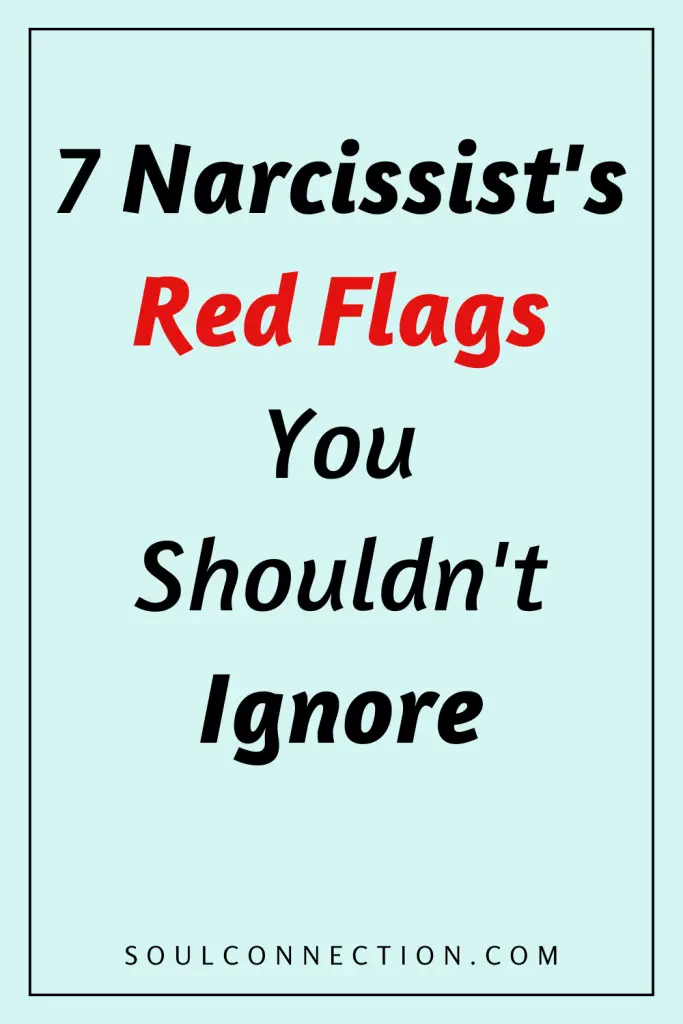Ah, narcissists. If only they came with a warning label, like a bottle of dodgy tequila.
Instead, they show up in all sorts of irresistible packaging: romantic partners who sweep you off your feet, friends who light up every room (with their own ego), or the co-worker who manages to take credit for your work before you’ve even finished it.
Spotting a narcissist isn’t always easy at first—charm can be a dazzling distraction—but the red flags are there. And trust me, ignoring them is about as helpful as ignoring a wasp hovering inside your shirt.
Here’s your crash course in narcissist detection, complete with handy tips that’ll help you keep your sanity—and your self-respect—intact.
1. The Conversation Is Always About Them
Ever tried telling a narcissist about your day? Spoiler alert: you might as well be talking to your houseplants. Narcissists are conversational black holes.
Every story, joke, or even minor inconvenience somehow circles back to their own epic saga.
Lost your job? They once lost TWO jobs, and bounced back gloriously, obviously. Had a rough morning? Wait till you hear about their traffic jam—no, really, listen.
If you find yourself regularly fighting to squeeze a word in, or if every meaningful conversation circles back to the same ego vortex, it’s not just bad manners. It’s a glaring sign.
Here’s a tip: Count how many times they ask you a follow-up question about YOUR life. If you run out of fingers and toes to keep track, congrats, you’re not talking to a narcissist.
But if you’re still at zero when dessert arrives, time to reconsider that “soulmate” assessment.
2. They Have a Complicated Relationship with Empathy
Empathy, for a narcissist, is a bit like a salad at a barbecue: present for appearances, rarely touched. Sure, they might say the right thing, but it’s often a script rather than genuine concern. When tough times hit, their support can feel…well, off.
You’ll notice a lack of real emotional presence. You might get superficial sympathy, but don’t expect them to actually be there when you need support. There’s a reason ‘emotional labor’ isn’t on their CV.
The next time you’re sick, sad, or struggling, pay attention to how they respond. Do they seem irritated that your drama is interfering with their day? Or do they manage to turn your crisis into a monologue about their own struggles?
If you’re answering “yes,” it’s not just poor listening skills. It’s part of the narcissist starter pack.
3. The Charm Offensive
Narcissists arrive on the scene with all the subtlety of a glitter bomb. You know the drill: intense eye contact, a flurry of compliments, “no one’s ever made me feel this way before” on the third date.
Your ego gets a massage, your friends start raising eyebrows, and you find yourself swept up in the whirlwind.
This isn’t genuine affection—it’s a strategy. The goal? To hook you fast, before you realise you’re being served the emotional equivalent of a three-day-old prawn cocktail.
If someone’s affection feels way too fast and way too good to be true, it’s worth pausing for a reality check. Healthy relationships grow like a garden—slow and steady.
Love bombing, on the other hand, is the relationship equivalent of planting a hundred sunflowers overnight and wondering why everything’s wilting a week later.
4. Boundaries? What Boundaries?
Narcissists are like toddlers in a lolly shop when it comes to boundaries: they want ALL of it, and they’re not asking for permission.
Maybe they show up uninvited, pressure you to share private details, or get huffy when you want an evening to yourself. The message is clear: your boundaries are a personal inconvenience.
Setting limits is met with guilt trips or sulking, or—better yet—a dramatic speech about why you’re being “distant” or “selfish.” If you start to feel that “no” is a dirty word, or you’re bending over backward to avoid drama, pause and take stock.
Remember, healthy partners respect your need for space and privacy. If you find yourself apologising for having needs, that’s not connection—it’s a red flag parade.
5. They’re Always the Victim (But Never at Fault)
Ever noticed how a narcissist’s life is a never-ending parade of unfairness? Their exes were all “crazy.” Their boss is a monster.
Their parents just don’t understand. It’s a world where they are perpetually wronged, misunderstood, or tragically let down by everyone else.
Here’s the kicker: no matter what goes wrong, it’s never actually their fault. Spill coffee on your blouse? Well, you shouldn’t have startled them while they were making that inspirational speech about themselves.
Relationship drama? Clearly, you’ve misunderstood their “boundaries.”
If you’re always the one apologising, or if you notice their stories leave out any trace of personal responsibility, watch your step. This isn’t humility—it’s Olympic-level blame-shifting.
6. Criticism Feels Like a Personal Attack
A narcissist’s ego is made of spun glass: sparkly, impressive, and prone to shattering at the smallest hint of criticism.
Bring up a concern, and out comes the full arsenal—defensiveness, counterattacks, icy silence, or even a masterclass in gaslighting (“Are you sure you’re not overreacting?”).
The result? You learn to keep your mouth shut, walk on eggshells, and question your own sanity. Funny how your partner never seems to have any feedback for themselves.
A little defensiveness is human. But when any gentle suggestion is met with rage or victim-blaming, you’re not dealing with healthy self-esteem. You’re facing someone whose confidence is built on quicksand.
7. Their Need for Control Has No Off-Switch
Life with a narcissist can feel like you’re starring in a reality show—one they’re directing and producing. Who you see, what you wear, how you spend your money, or even what you think—it’s all up for discussion (their discussion, not yours).
Control doesn’t always look like barking orders. Sometimes it’s constant “helpful advice,” backhanded compliments, or subtle digs that chip away at your independence.
You’ll start to notice your choices shrinking and your world revolving around their needs.
Spotting the pattern is the first step. No one deserves to feel like a supporting act in their own life story.
Why Narcissist Red Flags Matter
Spotting narcissism is less about diagnosing your mate and more about knowing when your gut is onto something.
These red flags are warning signs—not because your partner is a cartoon villain, but because relationships are supposed to be a two-way street, not a roundabout with only one car allowed on.
Narcissists can be fun, magnetic, and exciting. But when the red flags start popping up, believe them the first time.
Self-respect is not too much to ask for, and a relationship should never feel like a daily audition for the role of “Most Supportive Sidekick.”
If you see these signs, take a step back. Trust yourself. Maybe even phone a friend for a reality check (bonus points if your friend has been rolling their eyes at your stories for weeks).
Your time, your heart, and your peace of mind are all worth more than what any narcissist can offer.
And if you need a little extra motivation to trust those instincts, just remember: even a wasp in your shirt deserves less attention than a narcissist in your life.


